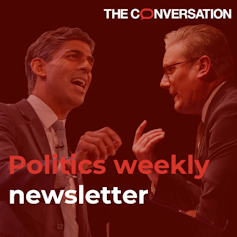In a few short years, TikTok has moved from being an app for teens doing dance routines in their bedroom to a key part of political campaigning. Both Labour and the Conservatives are on the app (with 191,000 and 58,000 followers respectively) attempting to win over younger voters.
But for large political parties, spending time, effort and money on creating TikToks is probably a waste of resources. The youth vote has been unchanged and locked in for many months. A few gimmicky videos are unlikely to change their mind. And, much of the content is more cringe than convincing.
In general, political advertising – whether it’s a three-minute television broadcast or a meme on Facebook – is thought to have minimal impact in persuading people to vote for a certain party or candidate. A short clip of a politician reciting stilted lines alongside a few childish graphics won’t win over voters no matter how slickly produced the video is. At best, it will amuse your base and give your communications team something to do.

Want more election coverage from The Conversation’s academic experts? Over the coming weeks, we’ll bring you informed analysis of developments in the campaign and we’ll fact check the claims being made.
Sign up for our new, weekly election newsletter, delivered every Friday throughout the campaign and beyond.
Some recent research suggests that TikTok’s role as a platform for politics is becoming more serious. But its foundations as an entertainment app mean that it is unlikely to ever be taken as seriously by political campaigns as Facebook and Twitter, which have well-established microtargeting capabilities. Plus, direct relationships with these platforms means that campaigns can better target specific demographics of voters.
When factoring in the cost of trying to reach voters, being able to target them with messaging efficiently is key. This election it seems that Labour is more willing to sink resources into digital advertising than the Conservatives. But the extent to which this was effective use of money will only be determined after the election.
TikTok does not allow paid spending on political ads. It is, however, relatively easy for campaigns to skirt around these rules if they want to. But campaigns that choose to post content on TikTok and hope it reaches the right people organically are left to the whims of the platform’s algorithm.
While it appears that Labour’s TikTok content is resonating more with users, it’s important to remember that the millions of likes their videos receive may not be from voters in the UK – and they certainly don’t indicate voting intention.
When it comes to TikTok, my advice to major parties would be to not bother. Politicians starring in videos and posting memes run a serious risk of simply embarrassing themselves. Engaging with older, more well-established trends can also look insincere, desperate and cringeworthy.
What people want to hear from politicians is solutions to their problems. Rather than posting memes of Cilla Black to win over younger voters, they should present a clear and detailed plan around housing or education. TikTok’s appeal to users, however, is short bursts of attention-grabbing content. It is impossible for politicians to use the platform for necessary, nuanced discussion around important policy proposals.
It is understandable that parties may feel that they have to be on TikTok, or would miss out on reaching voters or ceding a digital battleground. But just because your content may be reaching voters does not mean that the contact you create with them is going to be positive one. The Conservative party may be currently learning this lesson given that they recently suspended their paid digital ad spending.
Who can actually win the TikTok game?
Humour and satire have always played an important role in political coverage, from satirical cartoons to organised rallies. Campaigning has become far more performative in nature – politicians now feel the need to be seen in order to be heard.
There is ongoing debate around the influencing role that TikTok plays in our political world. It may be most useful to smaller parties and local independent candidates in reaching voters.
A prime example of this is someone like Count Binface who has built up his fame using several social media platforms, but now has more than twice as many TikTok followers as the Conservative party. His blend of humour and satire (with a sprinkling of meaningful analysis) is perfectly suited for a TikTok audience – and may convert into votes he likely would never have gotten otherwise.
Candidates wanting to raise local or niche issues may see real benefits from posting on TikTok and trying to bandwagon off relevant hashtags or location tags in their posts.
However, given that many candidates have only been finalised a few weeks before the election, they may not have the opportunity to set up an account, build a following and understand how to use short-form videos to address their potential constituents’ concerns. On top of all this, new accounts posting about relatively niche topics will find it especially hard for their content to go viral.
Studies in the US have shown that with careful prompting from platforms, people will be more likely to go out and vote when they might not have otherwise. TikTok may prove most useful in the closing days of the election campaign by reminding and encouraging otherwise disinclined members of the public about the importance of taking part in the democratic process.

